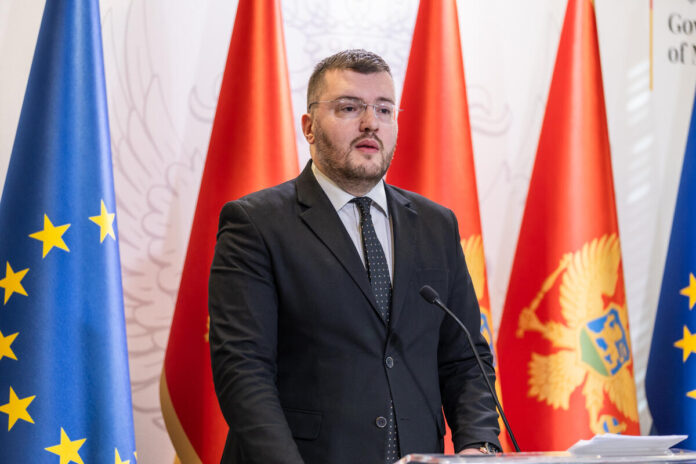His administration should not have entered into a contract with his son.
Koprivica, Photo: Government of Montenegro
Deputy Prime Minister for Political System, Judiciary and Anti-Corruption Momo Koprivica has lodged a criminal complaint with the Special State Prosecutor’s Office (SDT) against former Prime Minister of Montenegro, Milo Đukanović. He is suspected of committing the crime of abuse of official position as defined under Article 416 of Montenegro’s Criminal Code in relation to the “MHE Bistrica” case.
Koprivica’s office stated that Đukanović’s actions, particularly allowing his son Blaž Đukanović to enter into a concession agreement with the government he led, resulted in a significant violation of Article 14 of the Law on the Prevention of Corruption. This law prohibits any governmental body, where a public official serves, from entering contracts with entities in which the official or their relatives hold a private interest.
“This provision unmistakably indicates that the Government of Montenegro, as an executive body led by former President Milo Đukanović, was not in a position to authorize the contested concession agreement with ‘BB Hidro’ from Podgorica, given that the company is associated with his direct relative. A lawful evaluation of the allegations concerning this legal norm will reveal the extent to which the former Prime Minister, who was aware of his actions and their implications, contravened the provisions of the Law on the Prevention of Corruption, particularly those associated with limitations in public office and the abuse of authority regarding the interests of the public,” the statement elaborates.
Furthermore, it highlights the civil-law implications of the Concession Agreement executed between the Government as the Grantor and the entity ‘BB Hidro’ as the Concessionaire, considering the relationship between the then Prime Minister and his son, who is both a co-founder and the executive director of the company involved in this agreement. According to Article 14, paragraph 4 of the Law on the Prevention of Corruption, “If a public official or a governmental body acts against paragraphs 1, 2, and 3 of this Article, the provisions of the Law on Obligations regarding the nullity of contracts apply.” Consequently, any obligations from such a contract would be deemed absolutely null and void.
“This is primarily due to the provision in Article 101 of the Law on Obligations which states: ‘A contract that violates mandatory regulations or societal morality is void if the intended purpose of the violated rule does not indicate another form of sanction or if the law does not specify otherwise for a particular case.’ By systematically connecting these provisions with those of the Law on the Prevention of Corruption and interpreting them accurately, it becomes clear that the contested Concession Agreement contravenes mandatory regulations, specifically Article 14 of the Law on the Prevention of Corruption. The government, led by Prime Minister Milo Đukanović, ought not to have engaged in any agreement with a company founded by his son, who holds a direct legal interest in such a potentially detrimental deal, being a related party by blood. Thus, the formation of the Concession Agreement for the small Bistrica hydroelectric power plant is impermissible not just for one party but for both, rendering the agreement legally invalid,” the statement asserts.
They further assert that legality is a cornerstone of the rule of law, and that violations of this principle merit the most severe punishment: nullity.
“In this instance, nullity is explicitly cited as a penalty. Therefore, it is evident that the former Prime Minister’s actions, marked by a severe conflict of interest while representing and managing government activities, were unlawful, leading to a breach of a clear legal provision intended to obtain advantages for himself or related individuals, thereby creating an entirely void contract considered under existing legislation as contrary to mandatory regulations and societal morality.”
Koprivica has also submitted a request to the State Prosecutor’s Office to establish the nullity of this contract, referencing Article 107, paragraph 2 of the Law on Obligations.
“In addition to this, he has initiated efforts to proclaim the contract null with the Protector of Property and Legal Interests of Montenegro. Lastly, regarding the ‘MHE Bistrica’ case, he approached the Agency for the Prevention of Corruption to initiate investigations into violations pertaining to the provisions of the Law on the Prevention of Corruption regarding restrictions on public office. All procedural requests were made based on extensive analyses and solid evidence proposed to the relevant authorities to protect public interest and cleanse the legal system from corrupt activities that have benefited privileged parties,” concluded the statement from Koprivica’s office.
News


